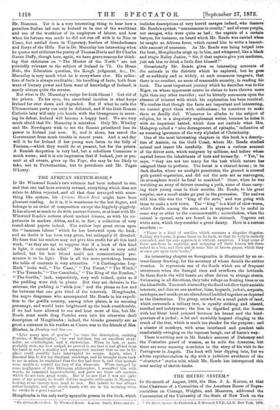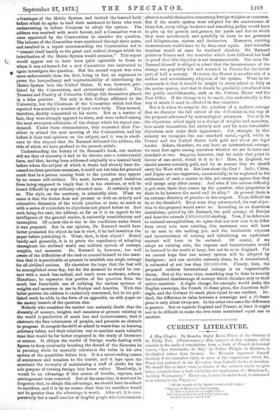THE METRIC SYSTEM.*
IN the month of August, 1866, the Hon. J. A. Kurson, at that time Chairman of a Committee of the American House of Repre- sentatives on Coinage, Weights, and Measures, addressed the Convocation of the University of the State of New York on the * The Metric System. By Frederick A. P. Barnard, S.T.D., LL.D. New York, 1872_,
advantages of the Metric System, and invited the learned body before which he spoke to lend their assistance to those who were endeavouring to induce Congress to adopt the system. The address was received with much favour, and a Committee was at once appointed by the Convocation to consider the question.
The labours of the Committee were continued through three years,
and resulted in a report recommending the Convocation not to 4' commit itself hastily to the great and radical changes which the
introduction of the Metric System would occasion." This report
ti„, would appear not to have been quite agreeable to those to whom it was addressed, for a new Committee was instructed to it again investigate the question. But the second report was even more unfavourable than the first, being in fact an argument to
prove the inexpediency and impracticability of introducing the Metric System into the United States. It was, however, pub- lished by the Convocation, and extensively circulated. The Trustees and Faculty of Columbia College felt themselves placed in a false position. Not only is this College affiliated to the University, but the Chairman of the Committee which had thus reported was actually a member of their own body. They seemed, therefore, doubly committed to his views. But as a matter of fact, they were strongly opposed to them, and were indeed among the most strenuous advocates of the change which his report con- demned. Under those circumstances, they requested their Pre- sident to attend the next meeting of the Convocation, and lay before it their real opinions on the subject, and it was in obedi- ence to this request that Dr. Barnard delivered the address, the title of which we have prefixed to the present article.
Understanding the history of Dr. Bernard's book, our readers will see that of necessity it had to be thrown into a controversial form, and that, having been addressed originally to a learned body before whom the subject of which it treats had already been dis- cussed on three previous occasions, it could not but take for granted much that to a person coming fresh to the question may appear by no means self-evident. We must, however, guard ourselves from being supposed to imply that it is too abstruse, or will be found difficult by any ordinary educated man. It certainly is not so. The style, on the contrary, is admirably clear. What we mean is that the doctor does not present us with an orderly and exhaustive discussion of the whole question at issue, so much as with a series of rejoinders to objections not placed before us. And such being the case, the address, so far as it is an appeal to the intelligence of the general reader, is eminently unsatisfactory and incomplete. Of course this is due to the conditions under which it•was prepared. But in our opinion, Dr. Barnard would have better promoted the object he has in view, if he had rewritten the paper before publishing it. What, then, is that object ? Stated briefly.and generally, it is to prove the expediency of adopting throughout the civilised world one uniform system of moneys, weights, and measures. Dr. Barnard is, however, too well aware of •the difficulties of the task to commit himself to the asser- tion that it is practicable at present to establish one single coinage for all civilised nations. He cherishes the hope that the feat will be accomplished some day, but for the moment he would be con- tent with a much less radical, and much more moderate, reform. Meantime, he separates this portion of the question from the much less formidable one of unifying the various systems of weights and measures in use in Europe and America. With this latter_portion his address is exclusively concerned, but in his pub- lished work he adds, in the form of an appendix, an able paper on the money branch of the question also.
Nobody who considers the matter can seriously doubt that the diversity of moneys, weights, and measures at present existing in the world is productive of much loss and inconvenience, that it obstructs the free intercourse of peoples, and presents an obstacle to progress. It compels the child at school to waste time in learning arbitrary tables and their relations one to another much valuable time that would be far better employed in the study of literature or science. It obliges the reader of foreign works dealing with figures to keep constantly breaking the thread of the discourse he is perusing while be mentally calculates the value in his own system of the quantities before him. It is a never-ending source .ofannoyance and vexation to the tourist, and it lays upon the merchant the necessity of maintaining a staff of clerks for the sole purpose of turning foreign into home values. Manifestly, it would be an advantage if this source of trouble, expense, and estrangement were removed. But at the same time, it must not be forgotten that, to obtain this advantage, we should have to submit to sacrifices, and it is by no means clear that the sacrifices would not be greater than the advantage is worth. After all, it is com- paratively but a small number of English people who have occasion often to trouble themselves concerning foreign weights or measures. But if the metric system were adopted for the convenience of those few, every village huckster and travelling pedlar would have ■ to give up the pounds and ,punces, the yards and feet to which they were accustomed, and painfully to learn to use grammes and kilogrammes, metres and decimetres. Moreover, existing measurements would have to be done over again. And valuable treatises would at once be rendered obsolete. Dr. Barnard points to France and the countries which have followed her lead as proof that this objection is not insurmountable. But even Dr. Barnard himself is obliged to admit that the inconvenience of the change was popularly felt and resented in France for the better part of half a century. However, the Doctor is no advocate of a sudden and revolutionary adoption of the system. What he re- commends is that it should be taught in every school as fully as the native system, and that it should be gradually introduced into the public establishments, such as the Custom House and the Post Office. If the change is to be made, this undoubtedly is the way in which it must be effected in free countries.
But it is when we come to the question of a uniform coinage that we discover the full extent of the difficulties in the way of the proposal advocated by meteorological reformers. Not only do the objections, which apply to a change of weights and measures, here assert themselves, but entirely new and far more formidable objections now make their appearance. For example, in this country we recognise but one standard metal,—gold, while in France and the United States both gold and silver are legal tender. Before, therefore, we can have an international coinage, we must first agree among ourselves whether we are to have one standard or two. Suppose, however, that we settle that point in favour of one metal, which is it to be? Here, in England, we should answer( certainly gold, and let us assume that we should carry the West with us. But how about the East ? India, China, and Japan are too important, commercially, to be neglected in the settlement of such a matter as this, yet everyone agrees that they will accept only silver money. And even if this serious difficulty is got over, there then comes up the question, what proportion ie there to be between the metal and its alloy ? At present there is an extreme diversity of practice in this respect. These difficulties lie at the threshold. Even were they surmounted, the real objec- tion to the proposal would await us. According to an American statistician, quoted by Dr. Barnard, the gold coinage of Europe and America exceeds £500,000,000 sterling. Now, if in deference to national susceptibilities, we agree that our new coin is to differ from every coin now existing, this enormous sum will have to be sent to the melting pot, and the intolerable expense and inconvenience of coining and introducing an equivalent amount will have to be endured. Of course, if we adopt an existing coin, the expense and inconvenience would be lessened to the world at large, but not to us in England. For we cannot hope that our money system will be adopted by foreigners ; and our metallic currency alone, be it remembered, is estimated at not less than £80,000,000. Clearly, then, the proposed uniform international coinage is an impracticable dream. But at the same time, something may be done to remedy the admitted disadvantage of moneys which circulate only in their native countries. A slight change, for example, would make the English sovereign, the French 25-franc piece, the American half- eagle, and the German 20-mark piece equal to one another. In- deed, the difference in value between a sovereign and a 25-franc piece is only about twopence. In the other two cases the difference is greater. But as regards England and France, at least it ought not to be difficult to make the two coins mentioned equal one to another.



































 Previous page
Previous page